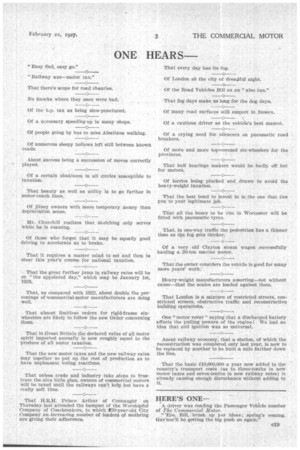ONE HEARS
Page 41

If you've noticed an error in this article please click here to report it so we can fix it.
"Easy find, easy go."
"Railway axe—motor tax."
That there's scope for road chanties.
No knocks where they once were bad.
Of the h.p. tax as being slow-punctured.
Of a necessary speeding-up in many shops.
Of people going by bus to miss Alsatians walking.
Of numerous sleepy hollows left still between known roads.
About success being a succession of moves correctly played.
Of a certain shakiness in all circles susceptible to taxation.
That beauty as well as utility is to go farther in motor-.coach Of jitney owners with more temporary money than depreciation sense.
Mr. Churchill realizes that sketching only serves while he is roaming.
Of those who forget that it may be equally good driving to accelerate as to brake.
That it requires a master mind to set and then to steer this year's course for national taxation.
That the great further jump in railway rates will be on"the appointed day," which may be January 1st, 1928.
That, as compared with 1922, about double the percentage of 'commercial-motor manufacturers are doing well.
That almost limitless orders for rigid-frame sixwheelers are likely to follow the new Order concerning them.
That in great Britain the declared value of all motor spirit imported annually is now roughly equal to the produce of all motor taxation.
That the new motor taxes and the new railway rates may together So put up the cost of production as to have unpleasant voting reactions.
That unless trade and industry take „steps to frustrate the nice little plan, owners of commercial motors will be taxed until the railways can't help but have a really soft time.
That H.R.H. Prince Arthur of Connaught on Thursday last attended the banquet of the Worshipful Company of Coachmakers, to which r50-year-old City Company an increa-ing number of leaders of motbring are giving their adherence. That every day has its fog.
Of London a§ the city of dreaylful night.
Of the Road Vehicles Bill as an "also ran."
That fog days make us long for the dog days. Of many road surfaces still suspect in Sussex.
Of a cautious driver as the vehicle's best mascot.
Of a crying need for silencers on pneumatic road breakers.
Of more and more top-covered six-wheelers for the provinces.
That ball bearings makers would be badly off but for motors.
Of lorries being• plucked and drawn to avoid the heavy-weight taxation.
That the best bond to invest in is the one that ties you to your legitimate job.
That all the buses to be run in Worcester will be fitted with pneumatic tyres.
That, in one-way traffic the pedestrian has a thinner time as the fog gets thicker.
Of a very old Clayton steam wagon successfully hauling a 20-ton marine motor. , That the owner considers the vehicle is good for many more years' work.'
Heavy-weight manufacturers asserting—not without cause—that the scales are loaded against them.
That London is a mixture of restricted streets, constricted streets, obstructive traffic and reconstructive building operations.
One "motor noter " saying that a discharged battery affects the pulling powers of the engine! We had no idea that coil ignition was so universal.
Anent railway economy, that a station, of which the reconstruction was completed only last year, is now to be replaced by another to be built a mile farther down the line.
That the basic £10,000,000 a year now added to the country's transport costs (as to three-tenths in new motor taxes and seven-tenths in new railway rates) is already causing enough disturbance without adding to












































































































